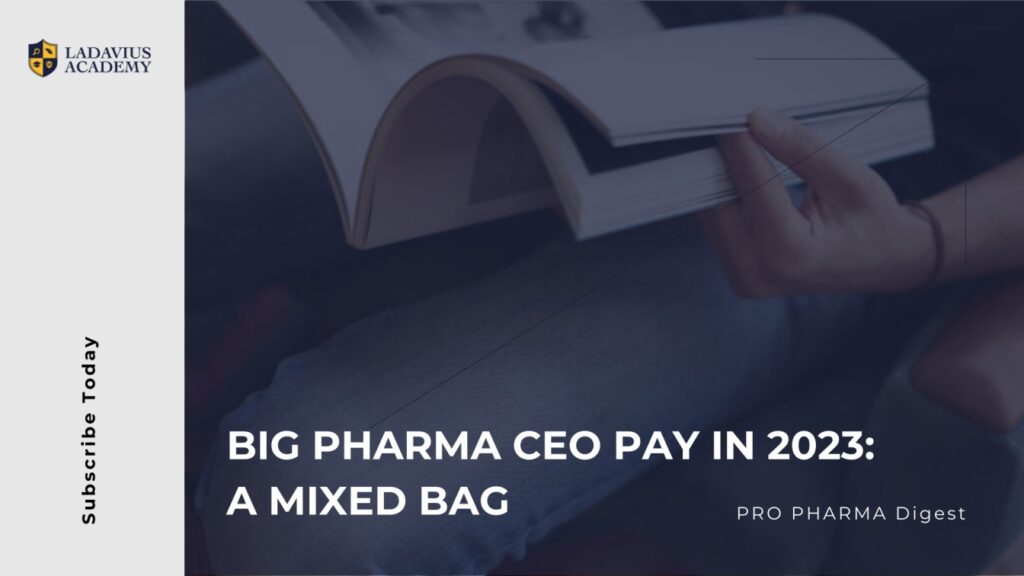Every year, the issue of executive compensation in Big Pharma comes under close scrutiny. This year is no different, as publicly traded companies reveal the total compensation packages for their CEOs and top executives in 2023. Here’s a breakdown of what some of the industry’s leaders took home.
Performance as a Benchmark
The data from 2023 reveals a clear correlation between a company’s financial performance and its CEO’s compensation. Leaders at the helm of high-performing companies generally enjoyed higher compensation packages.
-
AbbVie: Richard Gonzalez, the departing CEO of AbbVie, a company experiencing exceptional growth, received $25.7 million. His successor, Robert Michael, who inherits a strong position, also saw a compensation increase to $14.4 million.
-
Eli Lilly: David Ricks, CEO of Eli Lilly, benefitted from the company’s success with GLP-1 drugs Mounjaro and Zepbound, translating to a total compensation of $26.5 million. Lilly’s stock price surged in 2023, reflecting investor confidence in these medications.
-
Johnson & Johnson: Joaquin Duato’s compensation rose significantly to $28.4 million, likely due in part to J&J’s positive sales growth of 6.5%. The company also reaffirmed its financial guidance for the year.
Adjustments in Challenging Times
Conversely, CEOs of companies facing challenges saw adjustments in their compensation.
-
Pfizer: Albert Bourla’s pay fell 35% to $21.6 million. This decrease is likely a reflection of a decline in demand for Pfizer’s COVID-19 products, Comirnaty and Paxlovid, as the pandemic transitioned to an endemic state. Pfizer’s revenues fell 42% to $58.4 billion in 2023.
-
Moderna: Stéphane Bancel’s total compensation dipped to $17 million, which aligns with Moderna’s struggle to pivot to new areas as the focus on COVID-19 vaccines waned. The company’s revenues dropped from $19.2 billion in 2022 to $6.8 billion in 2023.
A Balancing Act: Performance and Societal Considerations
While the data demonstrates a correlation between performance and CEO compensation, the high salaries of Big Pharma executives remain a topic of ongoing debate. Critics often point to rising healthcare costs and argue that such compensation packages don’t necessarily translate into benefits for patients or promote responsible drug pricing.
For instance, in 2023, Moderna faced criticism for the high price of its COVID-19 vaccine, particularly in developing nations. This instance highlights the public’s growing concern about affordability within the pharmaceutical industry.
- GSK: Dame Emma Walmsley, CEO of GSK, saw her total remuneration rise to £12.7 million in 2023, up from £8.4 million in 2022. This increase is likely due in part to the success of GSK’s new RSV vaccine, Arexvy, which brought in £1.2 billion in sales. The company also enjoyed a strong overall year financially.
- AstraZeneca: Pascal Soriot, CEO of AstraZeneca, received a total compensation package of £16.9 million in 2023, up from £15.3 million in 2022. While the company achieved solid financial results, with total revenue growth of 6%, it fell short of analyst expectations in its most recent quarter.
- Novartis: Vas Narasimhan, CEO of Novartis, received 13.3 Swiss Francs (CHF) — or $15.3 million — in total compensation last year, up 21% from 2022. Narasimhan has overseen significant changes at Novartis, including the spinoff of Sandoz and a cost-cutting effort. It’s important to note that the company missed analyst expectations for earnings in Q4 2023.
- Roche: Thomas Schinecker, CEO of Roche in his first year at the helm, received 9.6 million CHF — $11 million — in total compensation. While Schinecker made a notable acquisition in the GLP-1 space with Carmot Therapeutics, Roche’s overall profit and sales dropped in 2023.
Looking Forward: Transparency and the Public Trust
Moving forward, continued transparency regarding executive compensation will be crucial for Big Pharma companies. Regularly disclosing these figures and outlining the rationale behind them can help foster public trust. Companies should also consider incorporating metrics beyond just financial performance when determining compensation. Metrics that reflect factors such as investment in research and development or access to affordable medications could be included.
As Big Pharma companies navigate a complex landscape of scientific innovation, market pressures, and social responsibility, striking a balance between rewarding performance and fostering public trust will be essential. Open communication, demonstrably linking compensation to factors that benefit patients and society at large, can play a key role in achieving this balance.
Posted April 2024.
Subscribe to our newsletter
Personalised by your preferences, subscribe to our newsletters to get the best of the Pharmaceutical Industry news in your inbox.
